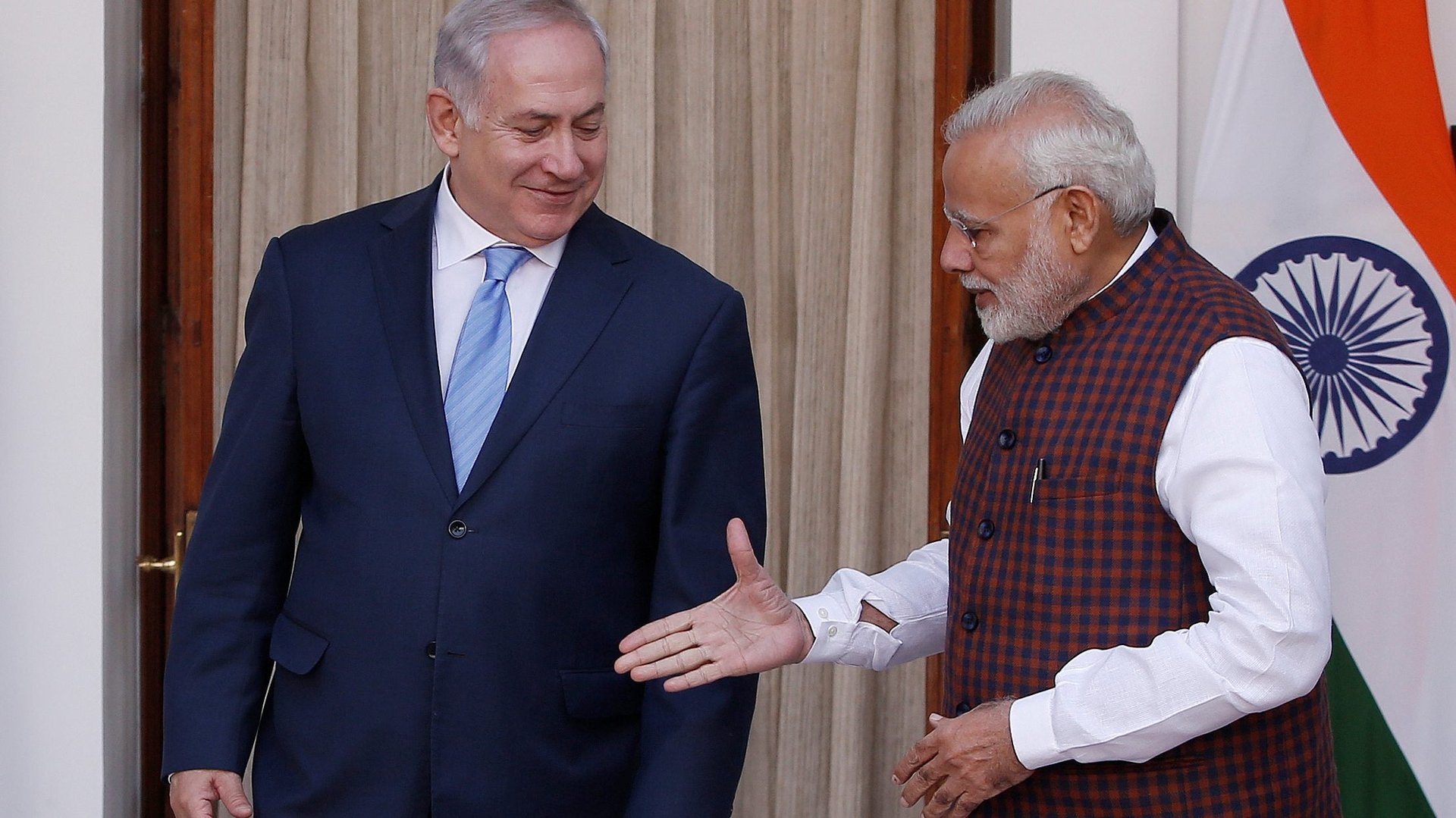How India’s relationship with the Israelis and Palestinians changed from Nehru to Modi
The ongoing crisis in the Gaza region has put India’s right-wing in a bind.


The ongoing crisis in the Gaza region has put India’s right-wing in a bind.
Even as Hindutva supporters have openly supported Israel’s violence in Palestinian territories, because of what they believe is a shared hatred for Muslims, the Indian government—under the leadership of the right-wing Bharatiya Janata Party—has been far more measured.
On May 17, India went so far as to support “the just Palestinian cause,” and an “unwavering commitment to the two-state solution” at a United Nations Security Council meeting. But in essence, this was a balancing act, because even as India recognized this “just” cause for Palestinians, it also “condemned” the “indiscriminate” rockets coming from Gaza and targeting Israeli citizens.
This diplomatic stance has emerged despite the rising bonhomie between Israeli prime minister Benjamin Netanyahu and Indian prime minister Narendra Modi.
“While New Delhi has pursued deeper ties with both sides on different tracks, make no mistake: The relationship with Israel has experienced a particularly big boost. Modi and Netanyahu have clearly hit it off, and this has helped usher in major bilateral gains—including through deeper trade and security ties,” Michael Kugelman, deputy director of the Asia program and senior associate for South Asia at the Wilson Center, told Quartz. “This makes all the more striking the fact that New Delhi has taken a very balanced position on the Gaza crisis, offering support to both the Israeli and Palestinian positions,” he said.
India’s position on Israel and Palestinian territories has a long history of careful diplomacy, right from the time of India’s first prime minister Jawaharlal Nehru.
India and Palestinian territories under Nehru
India recognised Israel as a nation in 1950, but the ties between the two countries were hardly friendly.
“Nehru’s ‘West Asia policy’ gave significant consideration to the Arab sentiments and opposed the Zionist project in Palestine,” Tanvi Pate, a visiting research fellow in the department of politics and international studies at the University of Warwick, wrote in March 2020.
But the Nehru administration also sought Israel’s assistance in the India-China war of 1962, and still didn’t change the geopolitical relationship between the two countries. Pate quoted Nicolas Blarel of Leiden University in the Netherlands on the peculiarity of this relationship: “Nehru created a precedent in obtaining military assistance from Israel without requiring any diplomatic exchange, or even publicly acknowledging the existence of such security assistance.”
Under the Congress government in the 1970s, India also became one of the first non-Arab countries to support the Palestine Liberation Organisation and its leader Yasser Arafat as the formal representative of Palestinians.
But gradually, this hesitance wore off and India established full diplomatic ties with Israel—embassies, ambassadors, bells & whistles—in 1992. Since then, the country has been slowly de-hyphenating the “Israel-Palestine” issue, and moving towards a neutral, if not quasi-equal friendship with both.
India and Israel under Modi
Cut to 2014, when Modi came to power and a slow friendship between India and Israel began to blossom. Until then, the relationship between the two countries was considered “under the carpet.”
“More bluntly, in private, Israeli officials and commentators have said that India has treated Israel like a ‘mistress’—happy to engage intimately in private, but hesitant to acknowledge the relationship in public,” Tanvi Madan, director of the India Project at Brookings Institution in Washington, wrote in 2016. “The explanations for this have ranged from Indian domestic political sensitivities to its relations with the Arab countries.”
But minister-level visits to Israel from India changed that impression. In January 2016, then-Indian foreign minister Sushma Swaraj visited Israel. And in July 2017, Modi became the first Indian prime minister to visit the country.
Even for Modi, who was more open about his friendship with Israel than any other Indian head of state, it called for a balancing act. He visited the West bank in February 2018. “Modi was the first sitting Indian prime minister to visit both Israel and the Palestinian territories,” Kugelman said. “In the Modi era, New Delhi’s relations with both the Israelis and the Palestinians have experienced major boosts. What we’ve seen is a clear policy of de-hyphenation, where India has pursued ties with both sides on their own terms,” he added.
India also has trade ties with both places, though Indo-Israeli trade got a major leg-up under Modi.
But despite this camaraderie, Netanyahu does not consider India a friend in its current conflict, much to the chagrin of right-wing Hindutva supporters.
And yet, India’s measured but strong statement at the UN Security Council meeting comes as no surprise to those who have followed this diplomatic journey. India could leverage this and even play a mediator in the crisis. “It enjoys goodwill on both sides, which gives it ample flexibility in terms of how to handle its diplomacy with both the Israelis and Palestinians,” Kugelman explained.
But even in doing so, it may go back to a time-tested strategy of offering to mitigate the crisis “quietly and privately,” in Kugelman’s opinion.